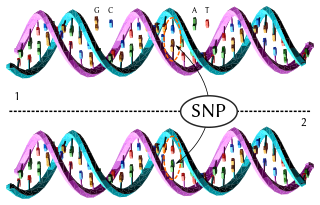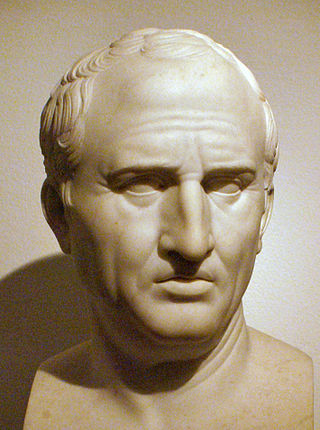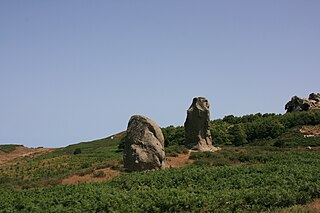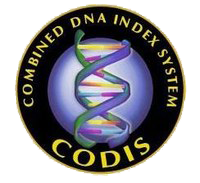
Heredity, also called inheritance or biological inheritance, is the passing on of traits from parents to their offspring; either through asexual reproduction or sexual reproduction, the offspring cells or organisms acquire the genetic information of their parents. Through heredity, variations between individuals can accumulate and cause species to evolve by natural selection. The study of heredity in biology is genetics.
A commune is an alternative term for an intentional community. Commune or comună or comune or other derivations may also refer to:

In classical Roman religion, a genius loci was the protective spirit of a place. It was often depicted in religious iconography as a figure holding attributes such as a cornucopia, patera or snake. Many Roman altars found throughout the Western Roman Empire were dedicated to a particular genius loci. The Roman imperial cults of the Emperor and the imperial house developed in part in connections with the sacrifices made by neighborhood associations (vici) to the local genius. These 265 local districts had their cult organised around the Lares Compitales, which the emperor Augustus transformed into Lares Augusti along with the Genius Augusti. The emperor's genius is then regarded as the genius loci of the Roman Empire as a whole.

A haplotype is a group of alleles in an organism that are inherited together from a single parent.
Online Mendelian Inheritance in Man (OMIM) is a continuously updated catalog of human genes and genetic disorders and traits, with a particular focus on the gene-phenotype relationship. As of 28 June 2019, approximately 9,000 of the over 25,000 entries in OMIM represented phenotypes; the rest represented genes, many of which were related to known phenotypes.
Systematic theology, or systematics, is a discipline of Christian theology that formulates an orderly, rational, and coherent account of the doctrines of the Christian faith. It addresses issues such as what the Bible teaches about certain topics or what is true about God and His universe. It also builds on biblical disciplines, church history, as well as biblical and historical theology. Systematic theology shares its systematic tasks with other disciplines such as constructive theology, dogmatics, ethics, apologetics, and philosophy of religion.

The method of loci is a strategy for memory enhancement, which uses visualizations of familiar spatial environments in order to enhance the recall of information. The method of loci is also known as the memory journey, memory palace, journey method, memory spaces, or mind palace technique. This method is a mnemonic device adopted in ancient Roman and Greek rhetorical treatises. Many memory contest champions report using this technique to recall faces, digits, and lists of words.

In genetics, a locus is a specific, fixed position on a chromosome where a particular gene or genetic marker is located. Each chromosome carries many genes, with each gene occupying a different position or locus; in humans, the total number of protein-coding genes in a complete haploid set of 23 chromosomes is estimated at 19,000–20,000.

Lutheran orthodoxy was an era in the history of Lutheranism, which began in 1580 from the writing of the Book of Concord and ended at the Age of Enlightenment. Lutheran orthodoxy was paralleled by similar eras in Calvinism and tridentine Roman Catholicism after the Counter-Reformation.

Fiat iustitia, et pereat mundus is a Latin phrase, meaning "Let justice be done, though the world perish".
Loci Theologici was a term applied by Melanchthon to Protestant systems of dogmatics and retained by many as late as the seventeenth century. It is also a way of ordering the strength of different sources used in Catholic theology usually attributed to Melchor Cano and still in use today.

Cappy is a commune in the Somme department in Hauts-de-France in northern France.
Locus is Latin for "place". It may refer to:

The Argimusco is a high plateau situated just north of Mount Etna in Sicily, southern Italy, between the Nebrodi and Peloritani Mountains. It lies within the boundaries of the communes of Montalbano Elicona, Tripi and Roccella Valdemone. The site offer a wide panorama of the volcano Etna, the Aeolian Islands, the mountains Rocca Salvatesta and Montagna di Vernà, cape Tindari, cape Calavà and cape Milazzo.

The Combined DNA Index System (CODIS) is the United States national DNA database created and maintained by the Federal Bureau of Investigation. CODIS consists of three levels of information; Local DNA Index Systems (LDIS) where DNA profiles originate, State DNA Index Systems (SDIS) which allows for laboratories within states to share information, and the National DNA Index System (NDIS) which allows states to compare DNA information with one another.

Peter Martyr Vermigli was a Reformed theologian of the Reformation period. Born in Florence, he fled Italy to avoid the Roman Inquisition in 1542. He lectured on the Bible in Strasbourg, Zürich and at the University of Oxford. Vermigli was primarily a professor of the Bible, especially the Old Testament. His lectures on I Corinthians, Romans, Judges, Kings, Genesis, and Lamentations were turned into commentaries.
Pseudo-Maximus is the conventional designation given to the anonymous author of a work misattributed to a Maximus, such as Maximus the Confessor or Maximus of Turin. Such works include:










